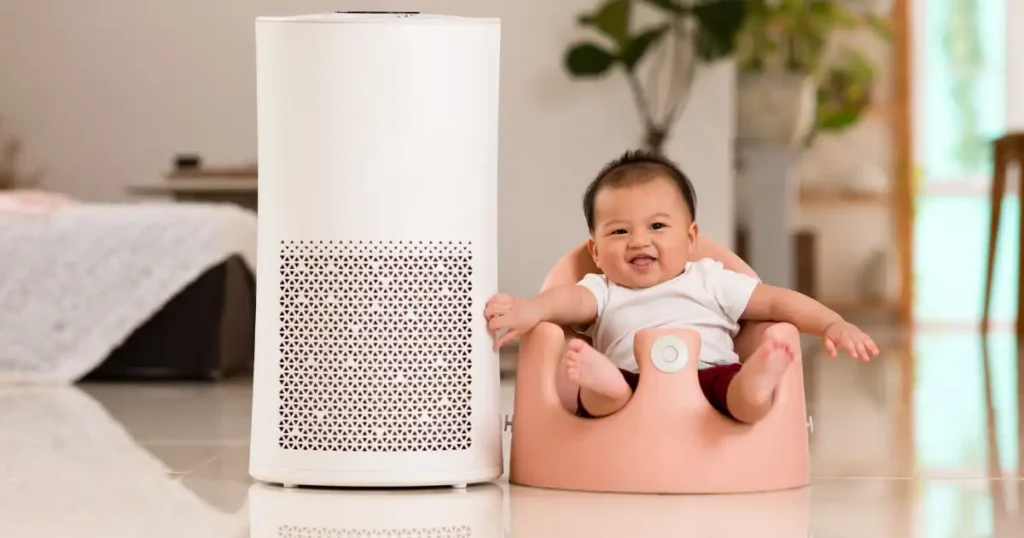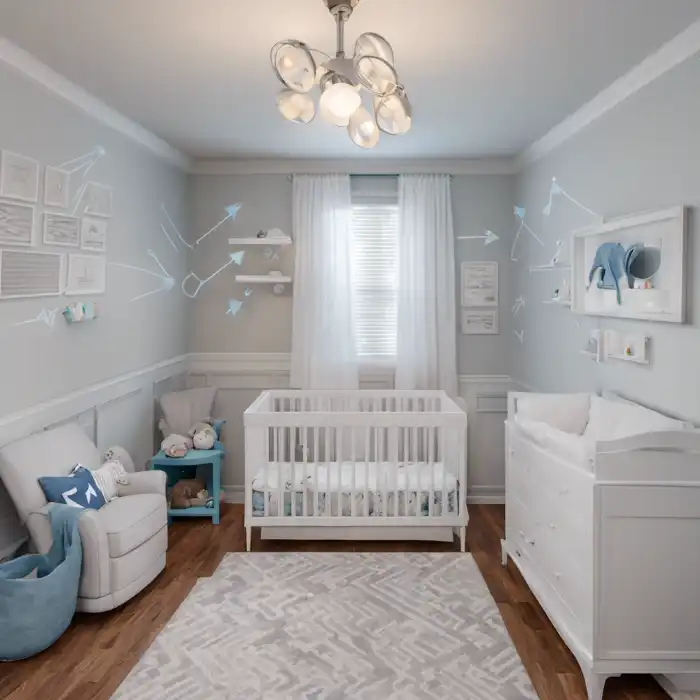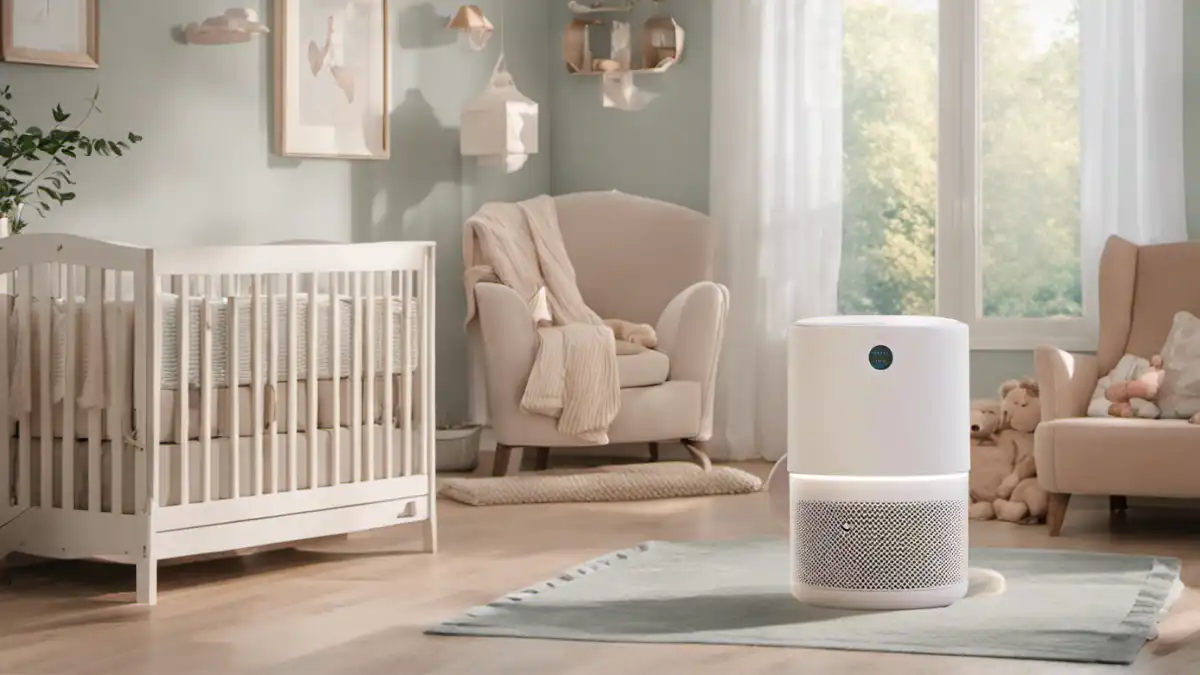Picture this: you’ve just welcomed your bundle of joy into the world, and your heart swells with love and protectiveness. You want nothing but the best for your baby, especially when it comes to their health and well-being. According to the EPA (Environmental Protection Agency), “Air inside homes can be more polluted than outdoors.” So, ensuring clean and safe air for your little one is a top priority. That’s where air purifiers come in!
But not so fast – Are Air Purifiers Safe for Babies? What benefits do they offer? And what precautions should you take if using one? This article covers everything you need to know about air purifiers and newborns. We’ll cover the pros and cons, safety tips, and how to choose the best model for your little one’s needs. Breathe easy, parents – we’ve got you covered!
Why is Air Quality Important for Infants?
For babies, indoor air quality is exceptionally important. Their developing lungs and immune systems are highly sensitive to pollutants in the air. Even small amounts of contaminants like dust and smoke residues can become trapped in their delicate airways. Exposure during pregnancy and the first couple of years can negatively impact respiratory health long-term.
Research shows air pollution indirectly harms lung development by causing issues like:
- Low birth weight
- Premature birth
- Delayed immune system growth
This leads to reduced lung capacity, increased respiratory problems, and higher asthma risks later in childhood. The effects persist even after clearing the pollution from the air.
Indoor air pollution also disrupts sleep and feeding for infants due to congestion. This severely hinders growth and development during critical early stages.
Air purification provides a healthy start for babies, giving them the best shot at breathing easy now and later in life. That’s why many parents often opt for air purifiers to ensure the air their little angels breathe is clean and safe.
Are Air Purifiers Safe for Babies and Newborns?
When it comes to your precious little one’s health and safety, you want to be 100% sure before using any new products. So, let’s dive into the big question: are air purifiers safe for your bouncing bundle of joy?
The quick answer is: “Yes, air purifiers are safe and beneficial when you pick the right kind and use it properly”. But you’re a careful parent who wants details – so let’s dig in!

With various types available, finding the right one is crucial; not all air purifiers work equally, so it’s essential to choose wisely.
For instance, you should steer clear of ionic purifiers or ozone generators. These can produce small amounts of lung-irritating ozone. Definitely not what you want around your baby’s delicate respiratory system!
The safest option for the nursery is HEPA and activated carbon air purifiers. These work wonders to capture dust, pollen, and germs without emitting any potentially harmful byproducts. Models with both filtration types clean the air effectively and are ideal for nurseries.
| Recommended | Not Recommended | ||
| HEPA filter | Highly effective at removing allergens and particles from the air | Ozone generators | Emit ozone, harmful to baby’s developing lungs |
| Activated carbon filter | Effective in eliminating odors and volatile organic compounds (VOCs) | Ionizers | Also, emits ozone |
As long as you steer clear of ozone-emitting purifiers and properly maintain a high-quality HEPA or activated carbon model, an air purifier can be a safe way to remove nursery pollutants and create a healthy breathing environment for babies. Phew, what a relief!
The Benefits of Using Air Purifier in the Nursery
Okay, parents, now that we’ve established air purifiers can be safe for babies, let’s talk about why they’re so great to have around babies in the first place. I’ll give you three reasons: reducing allergy triggers, improving sleep, and boosting overall health.
Breathe Easy – Those tiny baby noses and lungs are extra sensitive, so allergens like pollen or pet dander can irritate them. But a HEPA filter air purifier traps these pesky particles before reaching your infant. Studies show they significantly reduce allergy triggers.
Rest Easy – Want your baby to sleep more soundly? An air purifier can make a big difference here, too. They gently wash away indoor air pollutants and allergens that can congest your little one’s nose and disrupt sleep. With cleaner air, babies tend to sleep longer and wake less often.
Develop Fully – And let’s not forget the immune-boosting benefits. HEPA filters strip away mold, bacteria, and viruses so they don’t spread. This lowers the chances of respiratory infections that can really do a number on a baby’s lungs. Overall, purifiers promote stronger immune systems and better respiratory health.
| Benefit | How It Helps |
| Reduces asthma & allergy triggers | Traps dust, pet dander, mold, and other common allergens in the air |
| Lowers respiratory infection risk | Captures airborne bacteria, viruses, and germs |
| Lessens exposure to VOCs | Absorbs VOCs from household products and furniture |
| Creates ideal development conditions | Allows proper oxygen intake and growth by reducing pollutants |
With all these benefits, it’s easy to see why more and more parents are welcoming air purifiers in the nursery. Imagine your infant breathing easier, sleeping more soundly, and having fewer sniffles. That clean air is worth its weight in gold!
Choosing the Best Air Purifier for a Baby
Okay, parents, we’ve covered a lot so far. Let’s get down to the nitty gritty – how do you pick the perfect air purifier for your baby’s room? When selecting an air purifier, here are the key factors to consider:
- Coverage Area – First up, make sure to get the right size purifier for the room. Too large or small units won’t work as effectively. Check the square footage recommendations and opt for a model suited to the nursery’s dimensions.
- Filtration – Next, the filtration. As we now know, HEPA air filters are the gold standard. Look for true HEPA models that remove 99.97% of particles. This ensures your infant is getting the cleanest air possible.
- Ozone-Free Option – Remember the ozone concern? To avoid any worries, go for air purifiers that are clearly marked as “ozone-free.” This means these purifiers won’t let out any harmful ozone into your baby’s space.
- CADR – The Clean Air Delivery Rate of your air purifier should be around two-thirds of the room’s size. So, if you’ve got a space that’s about 10 feet by 12 feet, you’d want to choose an air purifier with a CADR of at least 80 to keep the air fresh and clean.
- Certifications – When looking for an air purifier, certifications are important to consider. Look for models certified by reputable organizations like the California Air Resources Board (CARB) and Energy Star. These certifications indicate that the purifier meets specific standards for efficiency and safety.
- Noise Level – Compare decibel ratings and opt for an air purifier on the quieter end of the spectrum. This will allow restful sleep for the baby – and you! Brands like Dyson or Coway make whisper-quiet models.
Tips for the Safe Use of Air Purifiers Around Babies:
You did it – you picked the perfect purifier for your baby’s nursery! But now you need some pointers on using it properly in the nursery. Follow these tips, and you’ll breathe easy, knowing your baby has the safest air possible.

1. Proper Placement:
Air purifiers can be quite weighty. Ensure the air purifier in your baby’s room is placed in a spot where it won’t tip over and potentially cause any accidents. And don’t put it too close to the curtains – we want the air to flow freely.
2. Regular Maintenance:
Make sure to change the filters as often as recommended. Mark the calendar if you have to! Regular filter swaps mean your purifier keeps working effectively. Don’t let buildup reduce its effectiveness.
3. Ventilation:
Ensure adequate room ventilation allows fresh air exchange, especially if your baby’s room is relatively airtight. Proper ventilation helps maintain a healthy balance of indoor air.
4. Monitor Air Quality:
Consider using an air quality monitor in addition to using an air purifier. This device can provide real-time information about air quality in your baby’s nursery, helping you make informed decisions.
By minding these simple tips, you can ensure your air cleaner provides the best breathing environment around your baby. With some extra care, your little treasure will thrive in their clean, fresh little oasis!
Final Thoughts
There you have it, parents! We’ve tackled the burning question: “Are air purifiers safe for babies?” The key takeaways: Look for true HEPA filter models to get clean air without harmful byproducts. Mind the noise levels and maintenance. Choose the right size purifier for maximum benefit.
While no device is completely risk-free, the multitude of perks make air purifiers a smart investment for many families. Cleaner air supports healthier babies!
Give your little treasure the gift of cleaner, healthier air, and watch them thrive! With a high-quality air purifier and some safety precautions, you can breathe easy knowing your bundle of joy has a fresh start.
FAQs
Do I need an air purifier for my baby?
Absolutely! Having an air purifier for a baby is a smart move, especially if you’re dealing with air pollution or allergens in your area. It’s like giving your baby’s lungs their own little bodyguard for a cleaner and safer indoor adventure!
Do all purifiers emit ozone?
No, not all air purifiers emit ozone. It depends on the type and model. High-quality purifiers, especially those with true HEPA filters, typically do not emit ozone. Always check the specifications of the specific purifier you’re considering, to ensure it meets your safety preferences.
Will an air purifier help with baby congestion?
Absolutely! An air purifier can help with baby congestion when used along with a humidifier. They work together to filter out nasties in the air and maintain optimal humidity, making breathing easier for your little one. Just make sure to choose models that suit your baby’s needs and your space.
Where do you put an air purifier in a baby’s room?
Place the air purifier in a strategic spot in your baby’s room for optimal results. Aim for a location with good airflow, away from obstacles, and not too close to the crib. This way, it can do its job efficiently without becoming a baby room obstacle course.
How do I know if my air purifier produces ozone?
To find out if your air purifier produces ozone, first, dig into the product specifications or user manual. Trustworthy brands, like IQAir, are usually upfront about ozone emissions. Another quick trick is to peek at the “Type” column for your purifier’s model. If it’s labeled as “Electrical,” it might be one of those ozone generators.

